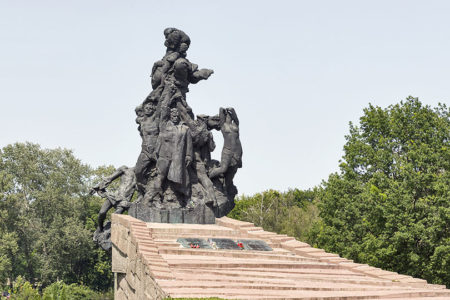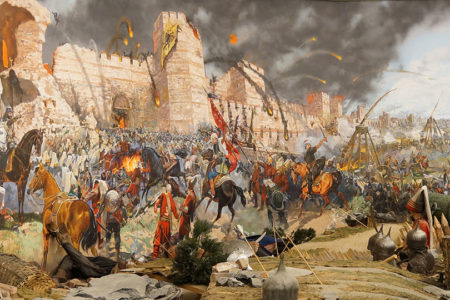They Feared Man So Little Because They Feared God So Much
During a few short years of my childhood, our family lived in southern England. Surrounded by relics of the past, I had many adventures while on holiday, visiting places that made history books come alive.
Of all the landmarks and historic sights intriguing to a boy of eight, the most memorable was Westminster Abbey. As we crossed the threshold of this imposing edifice, we entered the cavernous nave and almost 700 years of history. After coming to grips with the fact that people were actually buried inside the abbey, I became intrigued with the epitaphs on headstones embedded in the floor. One in particular impressed me. It stated simply, “He feared man so little because he feared God so much.”
The poignancy of the declaration did not elude me as I pondered the words that afternoon. In fact, it articulates a stance taken by hundreds of thousands throughout the church’s 2,000-year history: They dared to die rather than deny Jesus Christ.
Even a cursory reading of John Foxe’s classic work, Foxe’s Book of Martyrs, brings us face to face with Christians who suffered gruesome atrocities for their faith and died as examples of incomparable courage. Whether death came at the hands of gladiators or wild beasts or by beheading, burning at the stake, drowning, firing squad, or some horrifically cruel and unusual torture, these believers experientially grasped the truth that men can only kill the body, not the soul (Mt. 10:28).
Living in a day when Christians—shackled by political correctness—tend to be more cowardly than courageous, we can learn from the undeniable testimony of these devout men and women of faith who feared man so little because they feared God so much.
Their Bravery Inspired Others
Often the bravery of these martyrs was so remarkable their oppressors placed their faith in Christ as well. Here are some examples from Foxe’s Book of Martyrs.
Faustines and Jovita, brothers and citizens of Brescia in northern Italy, showed such extraordinary endurance despite repeated torture that an onlooker exclaimed, “Great is the God of the Christians!” Upon uttering these words, he was immediately seized and suffered a similar fate.
During the rule of Marcus Aurelius, persecution was so gruesome that spectators themselves shuddered in horror, yet were consistently astounded by the Christians’ resolve. A young man named Germanicus is a striking example. Sentenced to death by wild beasts, he was so fearless that “several became converts to a faith which inspired such fortitude.”
Marcella and her daughters Rhais and Potainiena were set afire after being doused with boiling pitch. An army officer named Basilides witnessed Potainiena’s execution and was emboldened to become a Christian. When he refused to take a pagan oath to swear by Roman idols, “he was dragged before the judge, committed to prison, and speedily afterward beheaded.”
Endowed with God-given endurance, many actively shared their faith even while subjected to the most violent brutality. Living in Marseilles, France, Victor tirelessly ministered by night to afflicted Christians and spent a fortune helping those who had lost property and position because of their faith. Eventually arrested, he was bound, dragged through the streets, and “treated with all manner of cruelties and indignities by the enraged populace.” His refusal to capitulate and renounce his faith was misconstrued as stubbornness. So he was stretched on the rack.
Praying that God would “endue him with patience,” he bore repeated torture. John Foxe wrote, “After the executioners were tired with inflicting torments on him, he was conveyed to a dungeon. In his confinement, he converted his jailers, named Alexander, Felician, and Longinus.” Upon receiving Christ as Savior, the jailers were immediately beheaded; and Victor, following additional torture, was thrown into a mill and crushed.
Another example of faithfulness under the direst of circumstances is the account of two men, the husband and brother of a young lady named Cecilia. Because of her testimony, they became Christians. They were subsequently arrested and sentenced to beheading. The two men shared the gospel with the officer leading them to execution who, after placing his faith in Christ, was also beheaded. Cecilia herself endured horrendous torment in a scalding bath, “and having continued there a considerable time, her head was struck off with a sword.”
Marcus and Marcellianus grew up in a pagan household but were tutored by devout Christians. When they gave their lives to Christ, family and friends used every means available to try to turn them from Christianity. Eventually, as a result of their consistent testimony, their immediate family also put their faith in Jesus Christ.
The entire household was subsequently arrested and tied to posts. Their feet were pierced with nails, and after several days they were impaled with lances. Before they died, their testimony caused Zoe, wife of the jailer, to become a Christian. Because of her decision to follow Christ, she was “hung upon a tree, with a fire of straw lighted under her. When her body was taken down, it was thrown into a river, with a large stone tied to it, in order to sink it.”
Rome’s Attempt to Exterminate Christianity
History reminds us that during the most intense times of persecution, untold thousands lost their lives. Around the turn of the first century, Pliny the Second, a Roman naturalist and writer, “seeing the lamentable slaughter of Christians, and moved therewith to pity, wrote to [Roman Emperor] Trajan, certifying him that there were many thousands of them daily put to death, of which none did any thing contrary to the Roman laws worthy of persecution.”
After Trajan, Adrian brutally persecuted Christians with the same vehemence. In this new round of persecution, such influential Christian leaders as Alexander, bishop of Rome; his two deacons; many prominent Christians and their families; and at least 10,000 others were put to death.
A time infamously referred to as the Era of the Martyrs was incited by Galerius, Emperor Diocletian’s adopted son. Provoked by his pagan mother, he continuously badgered Diocletian to begin a major persecution of Christians. Diocletian finally yielded; and February 23, 303, was declared Terminalia: a day the pagan world hoped to exterminate Christianity.
Churches were stormed and sacred books seized and thrown onto fires. Not content with merely burning the books, Diocletian and Galerius had a church leveled, ordered the same for all other churches in the empire, and declared Christians outlaws. As a result, “All the Christians were apprehended and imprisoned; and Galerius privately ordered the imperial palace to be set on fire, that the Christians might be charged as the incendiaries and a plausible pretence given for carrying on the persecution with the greater severities.”
Entire households were burned in their homes. Others were chased from their houses, tied together with stones fastened around their necks, and driven into the sea. In some cases, whole villages were slaughtered and burned because the inhabitants refused to renounce their faith in Christ.
Wrote John Foxe: “The persecution became general in all the Roman provinces, but more particularly in the east; and as it lasted ten years, it is impossible to ascertain the numbers martyred, or to enumerate the various modes of martyrdom.”
Not even the Roman military was immune to persecution. A remarkable account of courage is recorded about the Theban Legion, composed entirely of Christians. Maximian ordered a pagan sacrifice requiring the legion not only to participate but also take an oath of allegiance swearing to eradicate Christianity from Gaul. The entire legion refused and so enraged Maximian that he ordered every tenth man killed. When the remaining 90 percent still refused to comply with the order, every tenth man again was killed. When those still standing refused to recant, Maximian, in a fit of rage, ordered all surviving 5,400 soldiers executed. The sentence was carried out by other troops who hacked the Christians to pieces with their swords.
In the final verses of Hebrews 11, the author recounted people of faith who braved almost every conceivable abuse. Summarizing, he said they “obtained a good testimony through faith,” demonstrating fearlessness despite intense persecution (Heb. 11:39–40). He continued: “Since we are surrounded by so great a cloud of witnesses, let us lay aside every weight, and the sin which so easily ensnares us, and let us run with endurance the race that is set before us” (12:1).
The witnesses are those who were persecuted, as cited in the previous chapter. They are witnesses to us, providing an unswerving testimony of courage, endurance, and faith in the face of the ultimate trial.
There is no way to ascertain how many hundreds of thousands have perished for their faith in Christ through the centuries of church history. Nor is there space here to rehearse the myriad perverse methods used to torture and kill them. What seems obvious, however, is that these Christian martyrs took to heart the words of Jesus Christ who warned, “And do not fear those who kill the body but cannot kill the soul. But rather fear Him who is able to destroy both soul and body in hell” (Mt. 10:28).
In this age of political correctness, the words of Ignatius, bishop of Antioch, should encourage believers not to fear men but to fear God alone. Condemned as a Christian and transported to Rome for execution, he declared, “I care for nothing, of visible or invisible things, so that I may but win Christ. Let fire and the cross, let the companies of wild beasts, let breaking of bones and tearing of limbs, let the grinding of the whole body, and all the malice of the devil, come upon me; be it so, only may I win Christ Jesus!”







